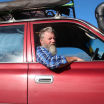It’s a question that crops up every time a news report shows a scene of devastation caused when a family caravanning holiday goes wrong: Should you need a license endorsement or special license to tow a trailer or caravan?
Perhaps it’s time to look at the proposal seriously.
Consider the facts: A brand-new Toyota HiLux or Ford Ranger four-wheel-drive dual-cab weighs in on the wrong side of 1900kg and has a Combined Vehicle Mass (the weight of the vehicle and trailer combined) limit of 5850kg and 6550kg respectively.
In many states and territories, drivers need a light-truck license (or equivalent) to be able to legally drive a truck weighing more than 4500kg.
Motorcycle riders, even those on small-capacity scooters and mopeds, require a separate license.
In workplaces, special training and an industry-recognised `ticket’ is required before employees are allowed to drive forklifts.
Yet that same Ford Ranger or Toyota HiLux with a 3000kg tandem caravan hitched up to it can be driven at 100km/h by anybody with a normal car license.
To some onlookers, this completely ignores the reality, including the fact that caravans have their own, often peculiar, handling characteristics, that popular vehicles such as dual-cab utes can also offer up interesting dynamics especially when full loaded, and that this 12-metre-long combination is also an articulated vehicle.
It’s possible to see their point.
Even the data that suggests that car-and-caravan combinations are no more likely to be involved in a crash in the first place must be tempered with the knowledge that some Australian insurers believe that as many as 30 per cent of such crashes are caused by a loss of control.
And as anybody who has ever watched a novice reverse a trailer or caravan will attest, it’s not a skill everybody picks up naturally.

Then there’s the fact that many caravan owners only hitch up their rigs every 12 month for the annual pilgrimage to the coast.
In that case, it’s entirely possible that the caravanner who claims to have 30 years’ experience in towing his or her van, in reality has one year of experience 30 times.
So, should a license be required to tow a trailer bigger than a box-trailer or heavier than about 750kg?
The simple answer is yes but, as always, there’s probably more to it than that.
Simply issuing a license to drive a car has been proven time and time again to be a bureaucratic solution to a practical problem.
There are clearly people out there who do indeed possess the necessary piece of plastic with `License’ printed on it, but who lack even the most basic skills when it comes to operating a motor vehicle.
What’s to say that the process involved in obtaining a trailer or caravan license wouldn’t also become as meaningless and misleading?
A better solution might be to develop a training program for those intending to tow a larger trailer rather than a simple one-off test.
By insisting on a practical assessment of a driver’s skill-set in a towing situation and offering solutions to any shortfall in those skills, there’s a fair chance that the roads would be safer every long weekend or Christmas holiday period.
But is this simply semantics, whereby `license’ and `training’ are otherwise interchangeable?
There is a danger of that, but if the emphasis is placed on the acquisition of skills rather than the obtaining of a plastic card, then the results might be better.
There’s also the fact that anybody who needs to tow a caravan is also likely to want to tow a caravan.
The requirement to train to achieve a specific goal is likely to be more acceptable to a target audience that actively wants to learn those skills.
That’s in contrast to a vast number of car-license holders who only obtained their license as a means to an end and continue to find driving a grudge activity.
And when that’s the situation, the results will always be predictably ordinary.
Avoiding the same degree of complacency and resentment in the case of a towing-training program should be possible, but even then, the skills taught must be relevant to the task – and risks - at hand.
If completion of such a program was to become a badge of honour, then the whole process would have stepped a little closer to achieving a safer driving environment for everybody.
Not to mention that, perhaps for the first time in a long time, the concept of a training course and a license worth holding might share the same end-user headspace.
Ultimately, while it’s possible to condemn the idea of a towing license as a rubber-stamp solution, the concept of teaching people to perform potentially dangerous tasks with greater skill and increased safety will never go out of fashion.





.jpg)
.jpg)

.jpg)
_0.jpg)


.jpg)




_0.jpg)
.jpg)
.jpg)
.jpg)
.jpg)







